Ade Edmondson doesn’t think of himself as a comedian. In fact, he’s pretty sick of the whole comedy thing.
“I mean, I know I did The Young Ones and Bottom and various other outings but… I never felt like a comedian,” he says. “I never stood up and cracked gags. I’ve always been part of a double act or a fiction.” He shifts in his chair. He is dressed relatively soberly in a moss-green corduroy jacket of the sort one imagines being worn by a character in The Archers. The only mild hint of comedic zaniness is provided by a pair of blue-and-white striped socks. “Do you call Ronnie Barker a comedian?” he asks.
Yes, I say, I do.
Edmondson nods, taking this in. “You see, I think he’s better than that.” He gives a short, sharp burst of laughter.
We are talking in a spartan dressing room in the Duke of York’s theatre in London where Edmondson, 57, will soon be appearing on stage in Neville’s Island, a comic play about a disastrous corporate team-bonding exercise that has recently transferred to the West End from Chichester, where it got rave reviews.
On the dressing table there is a welcome hamper left by the theatre management and a silver watch from Marks & Spencer worn by his character on stage. Otherwise, the room is bare. Edmondson is not one of those actors who likes to stick good-luck cards around the mirror or fill the surfaces with bunches of flowers and children’s drawings. He says he doesn’t want it to feel like home. This is simply where he comes to do a job. And that job, he insists, is absolutely Not Comedy.
“When people say ‘comedian’, I think ‘standup’, and I find standup immensely dull,” he says. “I don’t know why people bother going to watch it. You can have wittier conversation around a dinner table.”
But there’s obviously an appetite for it, I say. Look at all those sellout shows in the O2 with Michael McIntyre.
“Yeah, I don’t know what people think when they go. No one in particular, I just find it dull as an art form. Twenty minutes is all right, you know, but then I wish they’d bring on the spoon-bender or the dancers or do something else – make a variety show of it. But going and seeing a comic for an hour, then going for a drink, then going and watching him for another hour? You think: Christ, will this never end? Even if they’re really good! Even if they’re brilliant! An hour’s enough. I mean, two boiled eggs, that’s enough. You don’t need four boiled eggs do you?”
Still, he concedes that he enjoys a good double act, which is lucky because he was part of one himself and is married to Jennifer Saunders, one half of French and Saunders, and one of his co-stars in Neville’s Island is Robert Webb, one half of Mitchell and Webb (his other co-stars in the play are Miles Jupp and Neil Morrissey).
“There’s a dynamic between the pair, which is infinitely more interesting than one person’s psychosis or whether their girlfriend’s left them or not,” he explains.
Despite being resolutely determined not to become known as a comedian, Edmondson sort of fell into it anyway. He went to the University of Manchester to do a drama degree in 1976 and originally set out to be a serious actor.
“I thought I would go to the RSC and play Hamlet,” he recalls. But the easiest way to get an Equity card was to do a comic skit in a local jazz club so he got together with his best friend at the time to invent an act. And then, he says, “we kind of got sidetracked”.
The “we” is dropped softly into the conversation. It is a word Edmondson uses cautiously and with obvious reticence. Clearly, it still causes him pain. For many years, Edmondson’s partner in comedy was Rik Mayall, whom he met at university and who became his best friend and long-term collaborator. Together, they wrote and starred in some of the most popular alternative comedy programmes of the 1980s, including The Comic Strip Presents… and The Young Ones. In 1991, they teamed up again to write Bottom, which was a cult hit and ran for four years, spawning a stage show and a spin-off movie, Guest House Paradiso.
Their writing routine, Edmondson says now, consisted of “[a] couple of hours in the morning, off to the pub with a piece of paper and a pen, get pissed, write a load of bollocks, come back, tear that up and do some more the next morning”. And yet, amid the drunken rambling, there would always be a glimmer of something that survived the editing process – which probably accounts for Bottom’s unique brand of violent slapstick and crude hilarity.
“I have never laughed as hard as I have writing with Rik,” Edmondson says now. “Apoplectic laughter.”
And then, in June, Mayall died. He had never been quite the same after a serious quad bike accident in 1998 left him in a coma for several days, says Edmondson; the incident left Mayall “strangely more emotional; still very funny”. His death was horribly sudden. This is the first time Edmondson has spoken publicly about it.
“I mean, Rik’s death is just enormous and I haven’t talked to anyone other than close friends about it,” he says and, as he talks, he swivels round in his chair so that he is not looking at me, but is facing sideways towards the wall. His gaze drifts inwards. His sentences start and stop, slowly become more pause than speech. “I don’t really know how to talk about it to other people. I’m aware that people want something from me – not just you, but other people – and I don’t quite know how to give them what it is they want.”
He looks at me, apologetic. “I knew you’d ask and, erm, I’ve been trying to think of a cogent way of talking about it but I think, the thing is, I’m just completely awash, still. I don’t know where I am with him.”
The BBC approached him recently to take part in a tribute programme.
“I was sent the synopsis and it was all wacky and wild and…” he breaks off and sighs. “You could see it was just going to be a load of talking heads and clips, so I pulled out of that… I just think he deserves something better than that. And I think, if someone important dies, you can’t be flippant about it.”
Mayall’s death was made more difficult by the fact that the duo had not worked together for 10 years. Edmondson hadn’t wanted to retread old ground: he was proud of what they’d achieved and thought it stood on its own merits. He wanted to try different things – he formed a folk band, the Bad Shepherds, in 2008. He presented a few documentary series. Last year, he won Celebrity MasterChef. He didn’t want to reunite with Mayall just to do “a shit, late series like Morecambe and Wise”. He felt they’d had their allotted two boiled eggs, so why would they want four?
It was a decision, he says, that “confused” his writing partner: “I spent 10 years trying to explain to him why I didn’t want to work with him, you know, and it was tough.”
But they stayed friends. The last time Edmondson saw Mayall, the two of them went for a walk around Hyde Park: “We had a great time… and chatted about ordinary stuff.” They got on so well, he thinks, because they had a shared background. Both were the children of teachers, both went to “middle-class, direct-grant schools”.
“We were both, sort of, arty wankers but with a taste for beer,” he says, only half-joking. “So when we met we had a kind of shorthand.”
There was one crucial difference, however. Edmondson’s father was a geography teacher in the armed forces. As a result, he had a peripatetic childhood on army bases in Cyprus, Uganda and Bahrain. Then, at the age of 11, he was sent to Pocklington, a boarding school in East Yorkshire. He remembers being caned 66 times. He says blithely that slaps with hands or slippers didn’t count, so he didn’t bother tallying them up.
“We used to hold the bottom rung of a chair and a man would stride across the room and hit you with a stick,” he says. “It does sound ridiculous, doesn’t it?”
One teacher in particular seemed to take sadistic pleasure in the act and was nicknamed the Führer.
“He was a vicious, vicious, horrible man. It shocks me that people like that could be left in charge of children. There was such a cold cruelty to him.”
A few years ago, Edmondson went to a school reunion “and I went into this room and he was there and because I was on the telly he was all smarmy and came over all Nicholas Parsons and I had to leave. I couldn’t stand him pretending that he hadn’t thrashed me mercilessly so often.”
Edmondson was clear, when he married Jennifer Saunders in 1985 and his own three daughters were born, that they would experience an entirely different kind of upbringing, which he sums up as: “No boarding schools. And just be nice!”
His daughters – Ella, a musician, Beattie, a comedian, and Freya, an actor – are now all in their 20s and Edmondson has two grandsons, Fred, who is two, and eight-month-old Bert.
“It’s gorgeous,” he says. “I always wanted girls, never wanted boys… Boys are much more emotional than girls. They really are. I don’t know where this lie has come around that girls are emotional and boys aren’t. Boys, especially when they’re young, just never stop bloody bursting into tears… I’m a much bigger blubber than Jennifer.”
We get into a discussion about the last time he cried. And then, without any kind of preamble, he says that Mayall is not the only close friend he has lost of late. Two of his best friends committed suicide. It turns out that the last time he cried was when he was watching television and a drama contained a suicide plotline echoing the way in which his friend had died.
Both of his friends had been struggling with depression. One of them had simply stopped being able to sleep. “If you can’t sleep, you go mad,” says Edmondson. There is an unsettlingly long silence. Then he looks at me. “How many close friends do you think people have?”
I don’t know, I say. Probably five.
“Yeah, I think about that.”
So how many close friends does he have now?
“Well, not very many.” He laughs. “I’ve had three close friends my own age die in the last four, five years. It’s kind of unsettling. It casts you adrift a bit. And, um, it makes you feel rudderless, you know, you never quite know what your connection is with everyone else and you get a bit… You get slightly afraid other people will die.”
His wife, too, has had what Edmondson describes as “her own brush with death”. Saunders was diagnosed with breast cancer in 2009 and endured several gruelling rounds of treatment. “And my dad died this year as well,” Edmondson adds. “He had dementia for the last two years. Anyone will tell you that’s particularly gruesome so by the time he went, it was a relief really.”
His father was living in a home because his mother could no longer look after or lift him – “too heavy, you know”. Did he still know his own son?
“Towards the end, he didn’t recognise anyone much,” Edmondson replies, phlegmatic. He says he has turned to stoicism of late as a source of philosophical comfort.
“You have to admit to yourself what you’re in control of and what you’re not.” He blinks. “You’re actually in control of very little in life.”
Yes, I say, because there’s nothing else you can say when you’re sitting across from a man who has endured so much loss in such a brief period of time. A man who, in spite of it all, is still miraculously capable of finding the funny side – even if he’s not a comedian.
Neville’s Island is at the Duke of York’s theatre, London WC2 until 3 January 2015.
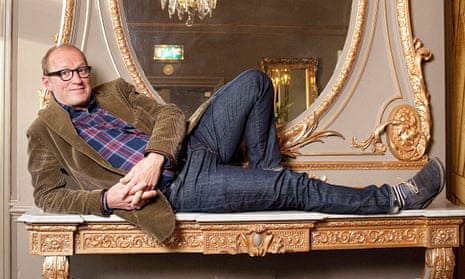
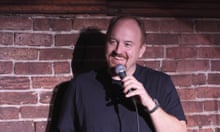
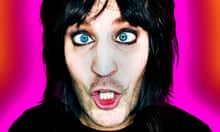
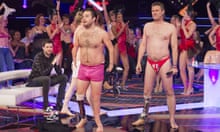
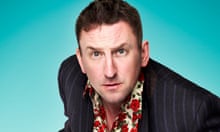
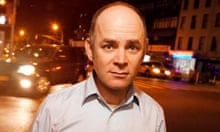
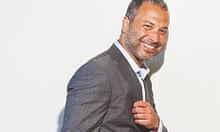
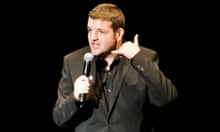
Comments (…)
Sign in or create your Guardian account to join the discussion